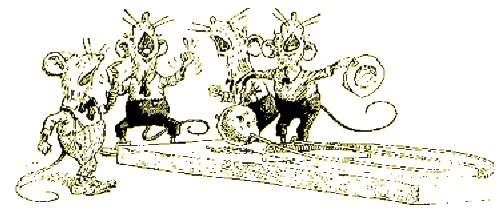Being a brief fanzine article on convention panels.
Text last revised: March 19, 1999
Pros and Cons: Panel Discussions
by Lawrence Watt-Evans
As every serious science fiction fan ought to know, and as lots of other people know as well, a phenomenon exists in this country, and in fact in several other countries as well, called "science fiction conventions." These events are traditionally held in hotels over a weekend, and provide an opportunity for fans to get together and talk about science fiction.
Not that they always do; often they talk about sex and politics, and they party and drink and watch old movies and do other fun stuff that may or may not have anything to do with science fiction.
There's a lot of variation in conventions; the smallest I've attended had about twenty people there, the largest about 7,000 (I missed the very largest few Worldcons and haven't been to Dragon*Con). I've been at cons that were just a single afternoon, and cons that ran six days; cons that were fun, and cons that were about as enjoyable as my last root canal.
There are certain features that are fairly standard, though. At a con of any size there's usually an art show, a huckster room, a video room, movies -- and programming.
Programming is where pros come in. You see, one of the ideas behind conventions is that they provide a place for science fiction writers and other professionals in the field to meet their readers and fans, and vice versa. Conventions accomplish this by inviting writers, artists, editors, and the like.
Once they've got them, they have to figure out what to do with them, of course, and that's where programming comes in. It's what the convention committee does to keep the pros busy.
This takes the form of readings, autograph sessions, speeches, and panel discussions. Panels are usually the favored format.
You know why panels are usually the favored format? Because we pros like them. You know why we like 'em?
Because they're easy.
Consider the alternatives.
Readings: In order to do a reading, you need to have written something. It has to be good enough that you can bear to read it aloud to a bunch of strangers. It has to be something you can read all of in an hour -- and for those of you who don't know, that means it can't be more than maybe 10,000 words, tops, which eliminates novels and novellas. You need to be able to actually read an entire story without putting people to sleep -- some people can't do that, believe me. And it helps if the story isn't published, because if it's published people will figure they can just go read it. It helps, also, if it's sold, because then people will spread word of mouth and so forth, and besides, fans don't like to think you're reading them your unsaleable garbage.
Most writers don't happen to have, at any given moment, 8,000 words of sold-but-unpublished stories that work when read aloud.
Speeches: People dread speeches. This is because most people aren't good speakers. Most speeches are boring. And most people, including pros, are very nervous indeed about getting up and speaking to a bunch of strangers for the better part of an hour. If you're reading a sold story, at least you have evidence that it's worth reading, because an editor somewhere accepted it and intends to publish it, but a new speech could be a total disaster. And besides, not all writers have anything worth saying in a speech.
There have been exceptions, certainly, like Orson Scott Card's Secular Humanist Revival, but most pros are not Cards.
Autograph sessions: The problem with these is that there has to be something to autograph. If you're a new writer, nobody's going to come to the autograph table. It's embarrassing to sit there next to, say, Jack Chalker (as happened to me back in '82, when I was a newbie) twiddling your thumbs while he signs stack after stack of books.
And nobody gets to know anything about you at an autograph table. You're just sitting there signing books. There's very little opportunity to impress anyone with your wit.
Panel discussions avoid all these problems.
If you're shy, or you don't know what you're talking about, you can just sit there and be quiet on a panel. If the discussion goes off in some bizarre direction, so what? And it doesn't matter whether you're a beginner with one story in print, or an old hand with your forty-seventh novel on the bestseller lists; all you have to do is show up and be able to say something that's at least vaguely on topic. If you're on a panel with Jack Chalker there's nothing to be embarrassed about -- nobody can tell who the audience showed up to hear. You don't need to write a speech, or have a story to read. You can talk if you want to, or keep quiet if you want.
So we pros find panels far and away the easiest sort of programming to deal with.
Now, I need to explain something here.
I had had no contact with organized fandom until after I was a pro. The first convention I ever went to was Rivercon V, in August, 1980, six months after my first novel was published. The first panel I ever saw was the new writers panel at Rivercon V -- "How I Broke Into Print And You Can Too," or whatever it was called. That was, I repeat, the very first convention panel I had ever seen in my life.
I was the moderator.
I wasn't just on the panel, I was running it, and I not only had never been on a panel before, I literally didn't know what one was, beyond the two-minute description Rivercon's programming director had given me an hour or so beforehand.
And I did just fine. The audience loved it.
See? Panels are easy.
So that's why pros like them.
What I've never figured out is why fans like them.
I mean, I've been on maybe sixty or seventy panels in the past ten years, at a guess, and I've only attended maybe a dozen others. I don't know why anyone goes to them.
After all, let's face it, you aren't going to learn all that much from a panel. Most writers don't know that much, and believe me, we don't do a lot of heavy preparation for these things. In many, probably most, cases, we do no preparation at all. It's not unusual in the least for pros to show up at a con not knowing what they're supposed to talk about, in front of an audience, five minutes later. Rivercon, which is otherwise a great convention, used to be especially bad about that -- I was never told in advance which panels I was going to be on, I just had to read the program like everyone else when I got there, and look for my name.
That's an extreme; most conventions do tell the participants in advance. But most of us don't pay any attention.
So what you're really watching, on most panels, is just a conversation, a bull session, with a moderator.
People say that science fiction fans are weird because they wear silly costumes and watch obscure movies and defunct TV shows and so on. None of that seems strange to me.
But they attend panels.
Now that's weird!

A panel in full roar
[Parts of this are out of date. Please pardon the references to the late Jack Chalker and the long-defunct Rivercon, and substitute the successful author and surviving convention of your choice.]
All contents and referenced pages are copyright by Lawrence Watt Evans except as noted.
All rights reserved
No reproduction permitted without permission of the author



